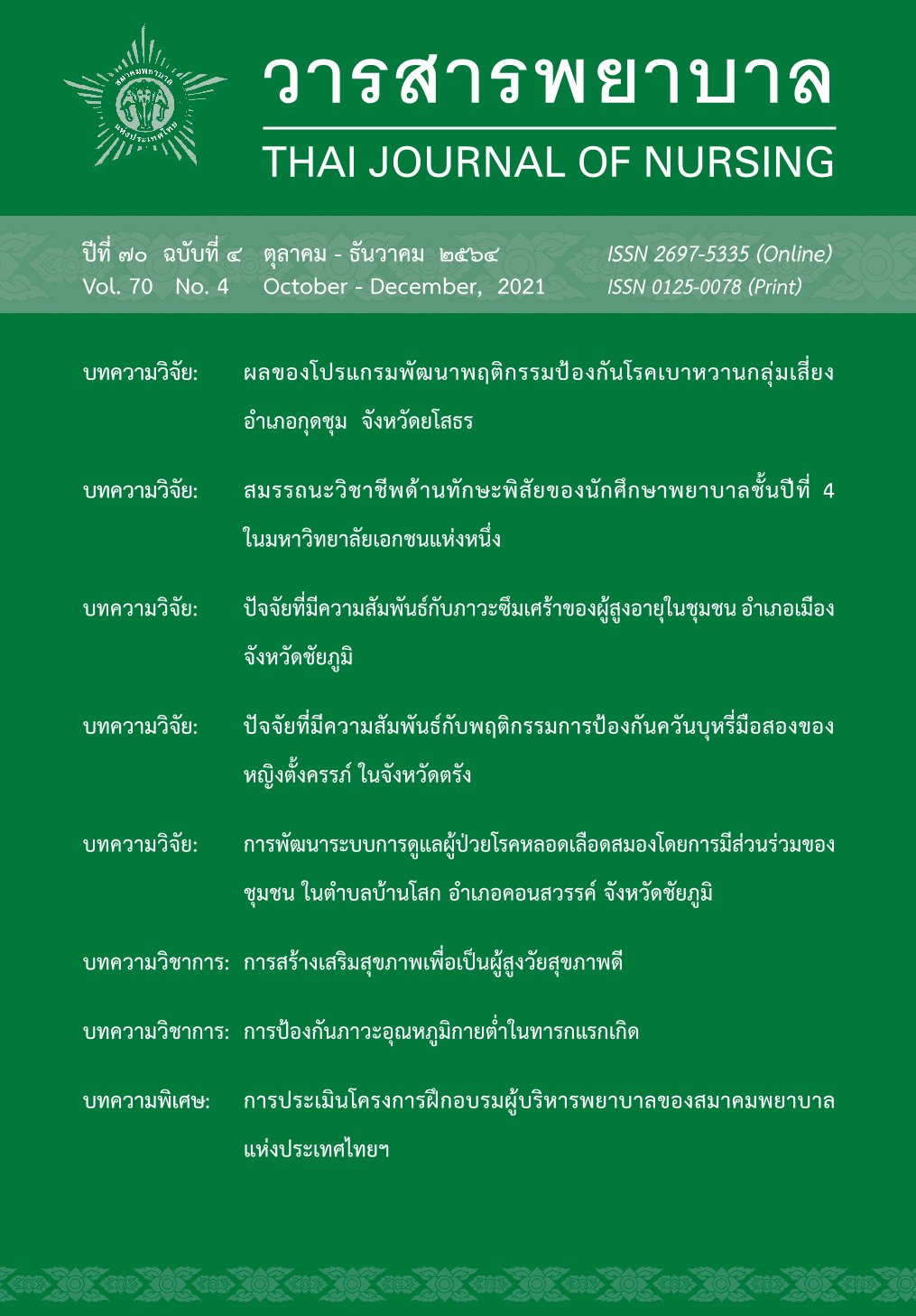The evaluation of nurse executive training programs of The Nurses' Association of Thailand
Main Article Content
Abstract
The purpose of this evaluative research was to evaluate the effectiveness of the nurse executive training programs of The Nurses' Association of Thailand. The sample of 123 subjects including trainees, their superordinates and the program commitees, was purposively selected. The research instruments were questionnaires and a semi-structured interview. Its index of item-objective congruence [IOC] was 1.00. Data were analyzed using descriptive statistics, t- test and content analysis. The results showed that the nurse administrators’ and the head nurses’ overall satisfaction towards the program was at a high level (M = 4.31, SD = 0.48) and at the highest level (M = 4.73, SD = 0.45) respectively. The trainees had desirable characteristics at a high level. After training, their knowledge, attitude and practical skills in management were significantly higher than before training at p < .001. Their performance-oriented developments and the work operations that affected the organization were at high levels. These results were consistent with the opinions of their superordinates. The strengths of these programs included the content, the instructors, and the relationship building activities. However, the responses of the various needs of the trainees and limited training duration should be improved.
Article Details
References
ศูนย์การแพทย์โรงพยาบาลกรุงเทพ. วารสารพยาบาลตำรวจ, 10(2), 244-252.
ทรรศนันทน์ ไทยอัฐวิถี, และอภิญญา จำปามูล. (2562). ปัจจัยที่มีอิทธิพลต่อการดูแลที่เน้นผู้ป่วยเป็น
ศูนย์กลางตามการรับรู้ ของพยาบาลวิชาชีพที่ปฏิบัติงานในโรงพยาบาลศรีนครินทร์
มหาวิทยาลัยขอนแก่น. ศรีนครินทร์เวชสาร, 34(2), 198-204.
ภัทรารัตน์ ตันนุกิจ. (2559). สมรรถนะสำหรับผู้บริหารทางการพยาบาลระดับต้น โรงพยาบาลสังกัด
สำนักการแพทย์ กรุงเทพมหานคร. วารสารโรงพยาบาลเจริญกรุงประชารักษ์, 12(2), 16-26.
รตาธร สอนเต็ม, เพชรน้อย สิงห์ช่างชัย, และนฤมล ปทุมรรักษ์. (2563). สมรรถนะผู้นำด้านนวัตกรรมของ
หัวหน้าหอผู้ป่วยในโรงพยาบาลระดับตติยภูมิโดยใช้เทคนิคเดลฟาย. วชิรสารการพยาบาล, 22(2),
40-57.
ศิริชัย กาญจนวาสี. (2554). ทฤษฎีการประเมิน (พิมพ์ครั้งที่ 8). กรุงเทพมหานคร: สำนักพิมพ์แห่ง
จุฬาลงกรณ์มหาวิทยาลัย.
ศิริพร สิงหเนตร, จรวยพร ใจสิทธิ์, และวิชยา เห็นแก้ว. (2560). บทความปริทัศน์: ภาวะผู้นำการพยาบาล
ในศตวรรษที่ 21. วารสารนเรศวรพะเยา. 10(1), 17-22.
Cohen, J. (1988). Statistical power analysis for the behavioral sciences (2nd ed). Hillsdale, NJ:
Lawrence Erlbaum Associates.
International Council of Nurses. (2020). Nurses: A voice to lead nursing the world to health
International Nurses Day 2020: Resources and evidence. Geneva: Author.


